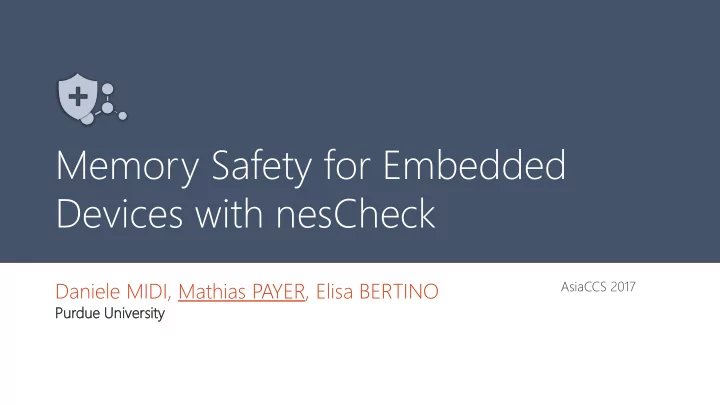

Memory Safety for Embedded Devices with nesCheck Daniele MIDI, Mathias PAYER, Elisa BERTINO AsiaCCS 2017 Purdue due Univer ersity sity MATHIAS PAYER – PURDUE UNIVERSITY ASIACCS 2017
Ubiquitous Computing and Security Sensors and WSNs are pervasive Small + cheap smart thermostats, production pipelines, “precision” agriculture Internet of Things as generalization Smart embedded systems + Internet-based services Security is paramount Stringent requirements on: • end-to-end system reliability • trustworthy data delivery • service availability MATHIAS PAYER – PURDUE UNIVERSITY ASIACCS 2017
Wireless Sensor Networks (WSNs) WSNs must be functional at any time. But… Unreli eliable able me medium um Const nstrained rained resour sources ces Unatten ttended ded envir vironment onment Trans nsient/per ent/perma manen nent failur ures es MATHIAS PAYER – PURDUE UNIVERSITY ASIACCS 2017
Motivations & Premises Low-level languages + no memory protection NesC suffers same problems as C Common techniques not applicable! Very constrained platform, no virtual memory, high overhead , … High modularity + whole program analysis Allows language-based techniques Not all checks are needed Some can be verified statically MATHIAS PAYER – PURDUE UNIVERSITY ASIACCS 2017
nesCheck Static Analysis + Dynamic Instrumentation Automatically catch memory bugs, provide sound memory safety guarantees while minimizing performance overhead. APPLICATIONS: Automatic hardening of embedded software, consumer and corporate devices, … MATHIAS PAYER – PURDUE UNIVERSITY ASIACCS 2017
Memory Safety Goals Bugs [static] Find all statically-provable bugs report errors Violations [static] Find all violations report warnings Checks reduction [static] Statically determine “safe” violations Runtime checks [dynamic] Instrument remaining violations, catch all memory errors at runtime. MATHIAS PAYER – PURDUE UNIVERSITY ASIACCS 2017
nesCheck T oolchain ncc COMPOSITION + PREPROCESSING clang SSA CONVERSION + TRANSFORMATION TO IR nesCheck nesCheck TYPE INFERENCE opt pass nesCheck METADATA CALCULATION + CHECKS REDUCTION opt pass nesCheck INSTRUMENTATION opt pass gcc TARGET PLATFORM COMPILATION MATHIAS PAYER – PURDUE UNIVERSITY ASIACCS 2017
Static Analysis MATHIAS PAYER – PURDUE UNIVERSITY ASIACCS 2017
Type System and Inference Engine Safe foreach declaration of pointer variable p do classify( p , SAFE); Seq eque uence nce foreach instruction I using pointer p do r result of( I ); Dynamic amic if I performs pointer arithmetic then classify( p , SEQ); classify( r , SAFE); if I casts p to incompatible type then classify( p , DYN); classify( r , DYN); MATHIAS PAYER – PURDUE UNIVERSITY ASIACCS 2017
Operational Semantics | Type Inference MATHIAS PAYER – PURDUE UNIVERSITY ASIACCS 2017
Metadata void f(int a) { In-memory metadata 1 s l s h int* p; One instance per variable at any time metadata pmeta; 0x00 0xff if (a > 0) e b 2 Explicit metadata variable p = malloc(4 * sizeof(int)); p pmeta.size = 4 * sizeof(int); Logical variables across basic blocks else 3 Metadata table entry p = malloc(20 * sizeof(int)); pmeta.size = 20 * sizeof(int); In-memory runtime information 4 check(p[3], pmeta) && p[3] = 13; p[3] = 13; } MATHIAS PAYER – PURDUE UNIVERSITY ASIACCS 2017
Dynamic Instrumentation MATHIAS PAYER – PURDUE UNIVERSITY ASIACCS 2017
Dynamic Checks Instrumentation For any violating pointer dereference Before GetElementPointer LLVM instruction: If pointer access was classified SAFE by static analysis, skip check . • Prepare bounds check: if (!checkBounds(p, offset, pmeta)) { trapFunction(); } • Check always false ? Skip check • (e.g., p[i] for p with fixed length >= 3 and i inferred as 2) Check always true ? Report memory bug • (e.g., p[i] for p with fixed length < 3 and i inferred as 2) Add bounds check. • Checks reduction Based on type tracking and pointer usage When propagated metadata results in constant check MATHIAS PAYER – PURDUE UNIVERSITY ASIACCS 2017
Dynamic Checks Instrumentation Optimizations to reduce metadata table lookups: Functions taking pointer parameters: void f(int* p) void f(int* p, metadata pmeta) Functions returning pointers: int* f() {int*, metadata} f() return p; return {p, pmeta}; MATHIAS PAYER – PURDUE UNIVERSITY ASIACCS 2017
Evaluation Results MATHIAS PAYER – PURDUE UNIVERSITY ASIACCS 2017
Type Inference Pointer Percentage AVERAGES Safe: 81% Seq: 13% Dyn: 6% 6% MATHIAS PAYER – PURDUE UNIVERSITY ASIACCS 2017
Checks Reduction Average: 20% % reduc ducti tion on MATHIAS PAYER – PURDUE UNIVERSITY ASIACCS 2017
Code Size, Performance, and Memory Overhead bytes Overhead Code size 5% 5%, performance 6% 6% As low as 7% 7%, always <10k 0kb MATHIAS PAYER – PURDUE UNIVERSITY ASIACCS 2017
Fault Injection AVERAGES Static: 21.6% Not Run: 36.8% Dynamic (caught): 41.5% Uncaught: 0% 0% MATHIAS PAYER – PURDUE UNIVERSITY ASIACCS 2017
State of the Art CCured Removes checks of SAFE pointers only SoftBound Instruments all pointers SafeTinyOS Requires extensive annotations or exclusion of entire components Relies on Deputy source-to-source compiler MATHIAS PAYER – PURDUE UNIVERSITY ASIACCS 2017
Naïve vs. Optimized Improvement Overhead NAÏVE: E: no check reduction optimizations NESCHEC ECK: K: with full check reduction optimizations Average improvement: 41.13% .13% MATHIAS PAYER – PURDUE UNIVERSITY ASIACCS 2017
Conclusion nesCheck Type system for pointer types: safe, seq, dyn Statically prove pointer operations safe Protect potentially unsafe operations at runtime APPLICATIONS: Automatic hardening of embedded software, consumer and corporate devices, … https://github.com/HexHive/nesCheck MATHIAS PAYER – PURDUE UNIVERSITY ASIACCS 2017
Recommend
More recommend